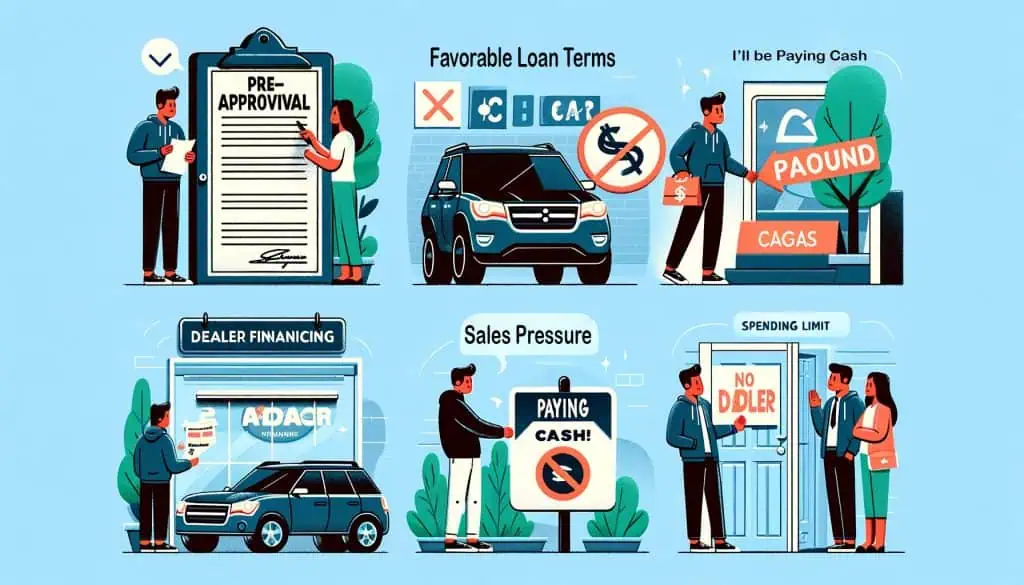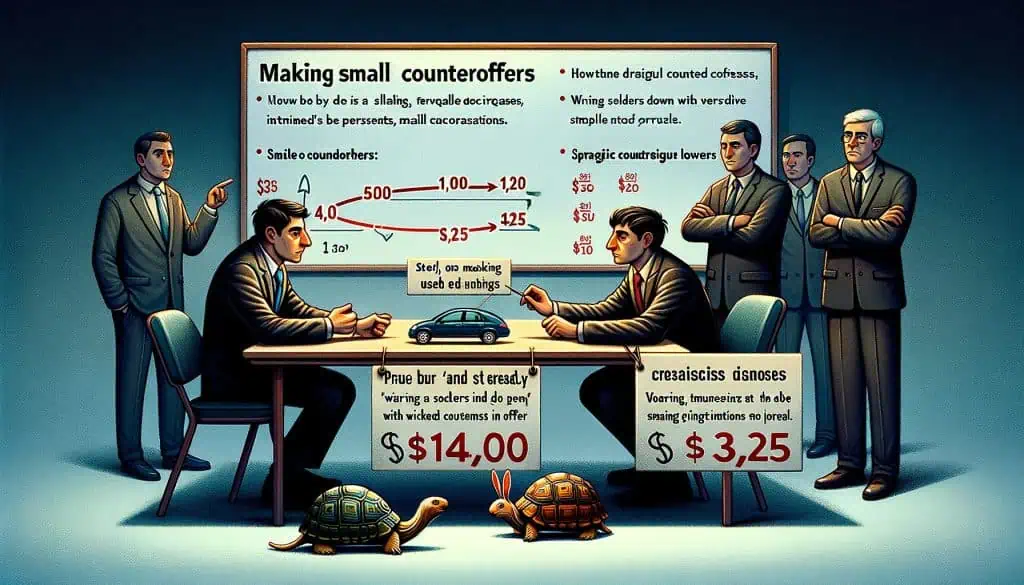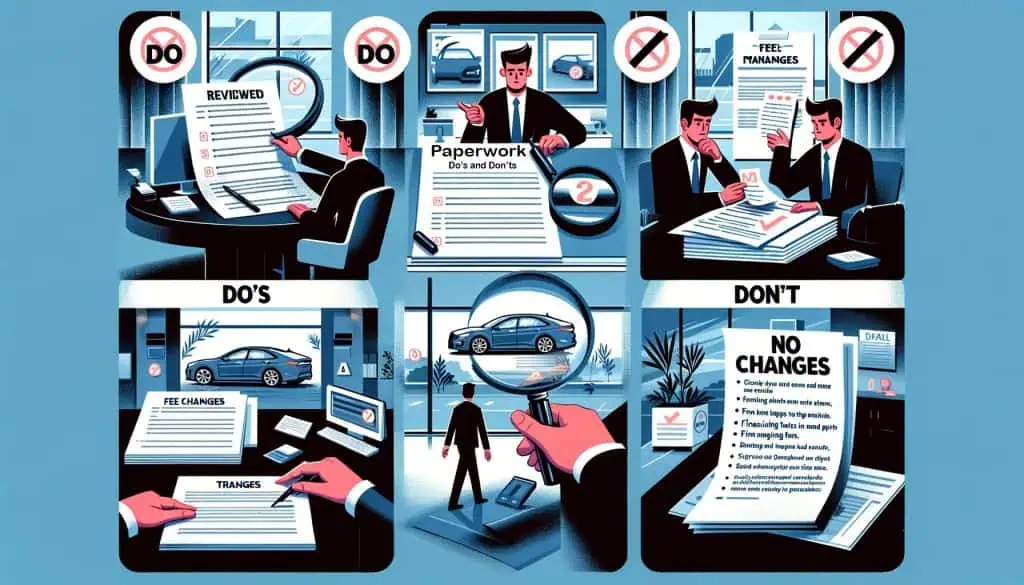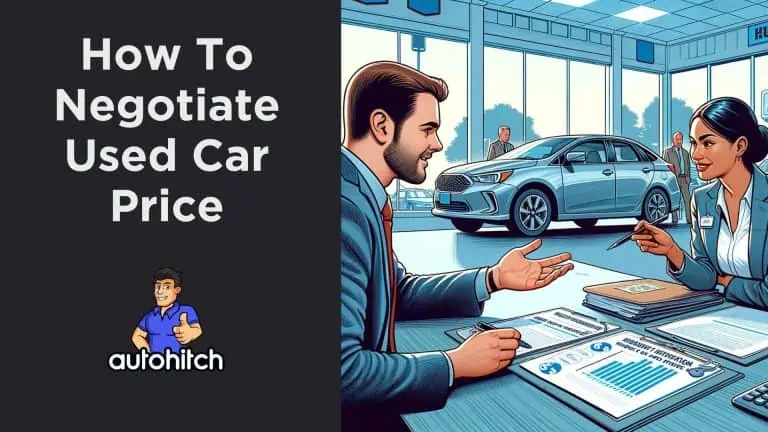As funny as it may sound, the first question a lot of people seem to have these days is can you negotiate used car price.
For the most part, the answer to that is absolutely yes, although there are some dealerships that practice a one-price model where it’s essentially take it or leave it. They claim their prices are better, but its more about providing a low pressure environment over actually saving money.
That being said, since you will be negotiating your price, here are a few used car negotiating tips I can share as a former dealer:
Key Used Car Negotiation Tips
| Tactic | Why It Works |
|---|---|
| Research True Market Value | Arms you with pricing data to support your stance |
| Get Pre-Approved Financing | Locks in favorable loan terms and sets firm budget |
| Make the First Offer | Anchors talks in your favor and presses seller |
| Use Small Counteroffers | Gradual increases motivate sellers to close |
| Focus on “Out-the-door” Total | Avoids hidden fees and accessories bloating cost |
| Be Ready to Walk Away | Leverages your power as the buyer |
Again, as a former dealer, I’ve participated in hundreds and maybe thousands of used car negotiations. I’ve seen smart tactics and people who thought they were prepared but didn’t actually have a clue.
Below I will give you some insider as well as common tips to shift the balance of power into your favor during any used car negotiation.
Relevant Articles To Read:
- How Much Do Dealers Markup Used Cars
- Can You Negotiate Car Price After Putting Down a Deposit?
- Out The Door Price
- How do you find out how much a dealer paid for a car?
- How Long Does It Take To Buy A Car
- When is The Best Time To Buy A Car
- How To Buy A Car With Cash
Table of Contents
Do Your Homework: Understand the Used Car Market
When buying any major purchase like a home or car, knowledge truly is power. The more research you do on pricing and the negotiation process itself, the better position you’ll be in when it comes time to talk numbers.
So before ever contacting a seller, spend time researching the used vehicle you want to buy and the broader used car market conditions using resources like:
- Kelley Blue Book
- Edmunds
- NADAguides
These services track sales data to provide average resale values and price ranges for virtually every used vehicle out there. They take into account critical factors like:
- Mileage
- Condition
- Accident history
- Location/region
So the valuation you get will reflect what people are currently paying for similar vehicles in your area.
Arming yourself with this pricing intelligence helps you:
- Gauge if a seller’s asking price is fair or inflated
- Decide what to reasonably offer as your starting bid
- Justify your offers with hard data if needed
Essentially, it prevents you from walking into any negotiation blind. Dealers and individual sellers will always know more about a vehicle’s history and value than you do. Doing market research helps balance that information gap.
Secure Financing Before Visiting Any Seller

Another vital preparation step is getting pre-approved for a used car loan through your own financing source, whether that’s your bank, credit union, or an online auto lender.
This serves a few key purposes:
- It locks in favorable loan terms before negotiating. Dealers often use financing as another profit center by inflating rates or pushing extras. With outside financing, you slam that door shut.
- It keeps monthly payments off the table. Dealers will press you to focus only on monthly payments, obscuring the purchase price and loan details that truly matter. But with financing pre-arranged, you have the luxury of saying “I’ll be paying cash” and keeping the negotiation centered solely around the car’s price.
- It establishes a concrete spending limit. Having a pre-approval letter in hand makes it crystal clear what you can realistically afford. This protects against getting emotionally swept up in the buying process and overspending.
In summary, independent financing puts you in the driver’s seat both financially and psychologically before you ever encounter sales pressure. That advantage is impossible to overstate when aiming for the best possible deal.
The Initial Offer: Starting Low (But Reasonable)
Many shoppers worry about making the first offer and accidentally “tipping their hand.”
In used car negotiations, consumers tend to fixate on a few hundred dollars. But professional negotiators think in terms of percentage discounts relative to an item’s fair market value.
With that principle in mind, I recommend making the first offer yourself at around 5% below your target vehicle’s typical going rate based on your research.
For example, if a 2013 Honda Accord with 60k miles tends to sell for $14,000 in your area, offer $13,300. This initial bid frames expectations and gets negotiations anchored around what you want to ultimately pay.
Some key advantages of making the first offer:
- Salespeople rarely volunteer their best deal upfront, so an initial offer from you forces the issue.
- Statistics show that first offers carry disproportionate weight in the final settlement amount.
- It prevents salespeople from “accidentally” suggesting an inflated number you feel pressure to just accept.
After extending this initial offer, avoid talking further until the seller responds. Silence is an effective negotiation tool as it transfers pressure. Once their counteroffer comes, stand pat until a compromise materializes around your target price.
Making (Small) Counteroffers

When the back-and-forth of used car price negotiation kicks in, I recommend moving your bid up very gradually in small increments. Big jumps play right into sales traps.
For example, if they counter at $14,000 on that $14K Honda we’ve been discussing, instead of splitting halfway and countering at $13,650, try $13,325.
This small increase relative to theirs maintains tension that incentivizes sellers to keep working with you versus just saying “take it or leave it” because you’re so close already.
Think tortoise vs. hare here – slow and steady concessions wear sellers down. As long as you remain engaged, the time and effort invested will ultimately motivate them to make the deal despite slim profit margins. They want the quick commission, not indefinite back-and-forth.
It’s All About the “Out-the-Door” Price
Another non-negotiable strategy I firmly recommend is insisting all price talks focus on the car’s total “out-the-door” cost – not monthly payments, not deductions for your trade-in, etc.
That means the final price you agree to must cover:
- The car’s purchase price
- Dealer documentation fees
- Mandatory taxes and DMV charges
That total bottom-line number is all you care about. By fixating only on that during negotiations, you avoid dealers muddying the waters and disguising extra profit through financing terms, accessory add-ons, etc.
If they insist on highlighting the “great monthly price” they can get you, just politely redirect the conversation. Say you’d prefer to discuss overall out-the-door cost first and foremost.
Don’t Fear Walking Away
As negotiations advance, you may reach an impasse where the seller simply won’t drop to your target used car price even after multiple counters. Or they may agree but try packing extras back into the deal.
In those cases, don’t be afraid to call it off and walk away if better options likely exist elsewhere. Yes, it can feel awkward stopping discussions and leaving empty-handed. But that fleeting discomfort pales in comparison to overpaying thousands for years to come.
You hold ultimate leverage as the buyer, even when it doesn’t seem like it in the moment. And sellers know that. So as you stand up and politely share your intention to continue looking at other vehicles, there’s a solid chance they’ll stop you before exiting and finally make their best offer after all.
Closing the Deal: Paperwork Do’s and Don’ts
Congratulations, you stuck to your guns and negotiated the used car price you wanted! But don’t let your guard down just yet. Safely getting this deal across the finish line involves following some vital dos and don’ts when inking the final paperwork.

DO:
- Carefully review all documents front and back before signing anything. Make sure they reflect the exact negotiated deal without surprises.
- Triple check that all fee and tax charges match what you discussed. Scrutinize each line item.
- Ensure all terms of any financing contracts or extras you agree to are clearly spelled out.
- Request copies of all paperwork for your records, preferably digitally for easy access.
DON’T:
- Let yourself get rushed, overwhelmed, or guilted into signing before fully understanding. It’s perfectly reasonable to take documents home for review if need be before committing.
- Agree to any financing beyond terms you already aligned to independently. There’s no valid reason they need revisiting.
- hesitate leaving the dealership without a signed contract if they spring unexpected fees or revisions.
Following these principles guarantees everything gets wrapped up fairly, transparently, and on your terms!
Closing Summary: Get the Best Used Car Price
Buying a used vehicle involves many variables. But arming yourself with pricing knowledge, independent financing, and tested negotiation strategies tilts the odds in your favor of getting a great deal.
Remember these core tips for negotiating used car prices:
- Research true market value using authoritative pricing guides
- Get pre-approved for outside financing
- Lead with a reasonably low but fair opening offer
- Use small counteroffers to force sellers’ hand
- Insist talks center on the total out-the-door price
- Don’t fear walking away from a bad deal
If you stick to this battle plan and remain disciplined yet flexible, your next used car negotiation will likely net you significant savings off what less strategic shoppers would pay. Just stay patient, focused, and driven by data rather than emotion.
Sources Used To Create this Article:
- https://www.carfax.ca/resource-centre/articles/how-to-negotiate-your-used-vehicle-purchase
- https://moneyfcu.org/5-tricks-used-at-car-dealerships/
- https://www.reddit.com/r/cars/comments/5zqyat/what_are_your_tips_to_negotiating_down_a_price_on/?rdt=35623
- https://www.readersdigest.ca/cars/buying-guide/outsmart-car-dealer/



